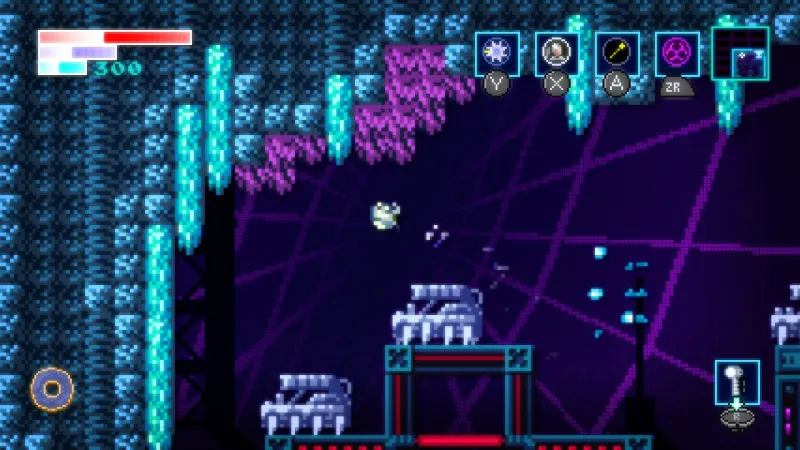


The core mechanic that drives this special spatial spelunking isn’t anything new – it’s kind of based on a mechanic that was introduced in a game that came out in 1991 – but it’s a mechanic that hasn’t been used enough, and Axiom Verge 2 uses it well. In that Familiar metroidvania fashion you’ll find new abilities that re-contextualize areas you’ve already been, and Axiom Verge 2 does a particularly good job layering spatial concepts on top of themselves and forcing you to think about the relationships between each place in order to progress. You’ll find scraps of paper scattered about that give you tidbits of lore and flesh out the universe, but more importantly the scope of the physical world you traverse unfolds gradually and organically. The motives of your new female protagonist are inferred by conversations she has with others, making the whole reason you’re there in the first place part of the overall mystery. Like any good exploration focused game you’re given control of your protagonist and are sort of thrown into the story in media res. Axiom Verge 2 drops these elements in favor of focusing more on its exploration – and that exploration is great if you don’t mind being completely lost sometimes.

AXIOM VERGE 2 REVIEW CODE
If you really hated the combat in the first game, or thought that there were too many pointless weapons, or if you thought the code system for finding additional secrets was way too obtuse, then you’re in luck because Axiom Verge 2 does none of those things. The result of this is that I can’t easily say “if you liked Axiom Verge 1, you’ll also like the second”, which is honestly something I’d rather not ever say about any sequel. While the original Axiom Verge was often criticized as being too iterative of the supposedly formulaic Metroidvania mold, its sequel completely drops entire aspects rather than build upon them. Putting aside the issue where readers shouldn’t have to do prerequisite reading or playing to understand a review, the comparison approach is more relevant when sequels are more iterative than innovative, since with iterative games the expectation is that the gameplay and other elements will evolve rather than mutate. When reviewing sequels it’s really easy to fall into the trap of making the whole essay be about “this vs that” comparing the first game to the second.


 0 kommentar(er)
0 kommentar(er)
